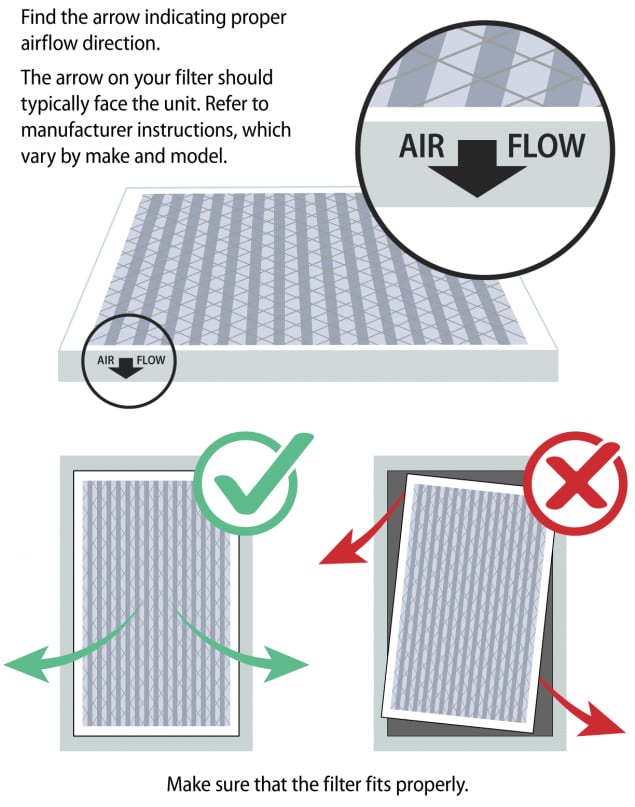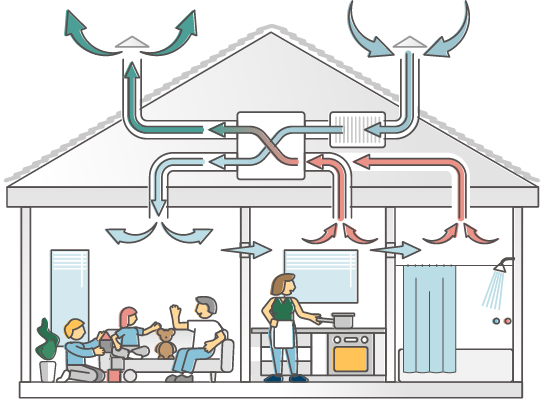The Duty of Home Ventilation in Protecting Against Mold And Mildew and Indoor Allergens
Home ventilation is a crucial component in maintaining a healthy indoor setting. It manages humidity levels, which can protect against the development of mold and the buildup of irritants. Numerous property owners neglect the significance of proper air flow, often bring about unseen problems. Understanding just how ventilation systems function and their influence on air high quality could be the trick to a healthier living room. What steps can be taken to improve these systems successfully?
Understanding Home Air Flow Systems
While many home owners may forget the significance of air flow, comprehending home ventilation systems is necessary for preserving indoor air top quality and avoiding mold growth - Home Ventilation Melbourne. These systems facilitate the exchange of stale indoor air with fresh outside air, effectively decreasing toxins and wetness degrees. Common types consist of natural ventilation, which counts on wind and temperature distinctions, and mechanical ventilation, which utilizes air ducts and followers to control airflow. Furthermore, well balanced ventilation systems integrate both approaches to optimize air top quality. Properly made and kept ventilation systems can assist manage temperature and humidity, ensuring a comfy living environment. House owners should take into consideration variables like home layout, tenancy, and environment when selecting an air flow system to finest fit their requirements and improve overall air top quality
The Impact of Humidity on Mold And Mildew Development
Humidity plays a critical role in mold growth, making it a crucial aspect for property owners to keep track of. Mold and mildew flourishes in atmospheres where humidity degrees exceed 60%, as these conditions provide the moisture essential for spores to multiply and germinate. High humidity can arise from numerous sources, consisting of poor air flow, water leaks, and cooking or bathing tasks. When humidity levels remain elevated, mold can establish rapidly on natural products such as drywall, fabric, and timber. Homeowners need to make use of dehumidifiers and guarantee appropriate ventilation in areas prone to dampness, such as shower rooms and basements. Keeping indoor moisture between 30% and 50% can considerably minimize the danger of mold development, adding to a much healthier living environment.
Determining Common Indoor Allergens
Indoor environments can harbor a selection of allergens that impact health and convenience. Usual indoor irritants include allergen, animal dander, mold spores, and plant pollen. Dust mites flourish in bed linens, carpets, and upholstery, feeding on natural material and adding to respiratory concerns. Family pet dander, composed of little flakes from skin and hair, can cause allergic reactions in delicate people. Mold spores, typically present in moist areas, can multiply and impact air top quality. Furthermore, plant pollen can penetrate homes via open home windows or on clothes. Identifying these allergens is necessary for keeping a healthy and balanced interior setting. Understanding of their presence allows property owners to take proactive actions to lessen direct exposure and boost general indoor air top quality.
Advantages of Proper Air Flow
Appropriate ventilation is important for preserving a healthy and balanced interior setting, as it aids to manage air top quality and decrease the buildup of pollutants. Ample air flow promotes the exchange of outdoor and interior air, therefore diluting harmful substances such as unstable natural compounds, irritants, and dust. This process not just improves convenience but additionally contributes to the general wellness of occupants by reducing respiratory issues (Home Ventilation Melbourne). Moreover, correct ventilation efficiently manages moisture degrees, minimizing the probability of mold growth and cultivating a drier setting for health. Furthermore, it can boost energy effectiveness by ensuring that cooling and heating systems operate better, leading to lower power prices. On the whole, proper air flow is a page crucial element in advertising a healthy and balanced and safe home

Tips for Improving Home Air Flow
Numerous home owners may neglect it, enhancing home air flow is essential for improving air top quality and preventing mold and mildew development. One reliable approach is to frequently open home windows to advertise cross-ventilation, enabling fresh air to flow. Mounting exhaust followers in washrooms and kitchens can efficiently eliminate moisture-laden air, minimizing moisture degrees. Homeowners need to also think about utilizing air cleansers with HEPA filters to record irritants and contaminants. Regularly keeping cooling and heating systems, including transforming filters, warranties peak air flow and efficiency. Sealing leakages around doors and home windows can stop outside air from entering, which helps preserve a consistent indoor environment. Including houseplants can normally enhance air quality while including aesthetic worth to the home.
Often Asked Questions
Just how Often Should I Tidy My Home Ventilation System?
Identifying just how typically to clean a home air flow system depends upon various variables, consisting of usage and ecological conditions. Home Ventilation Melbourne. Usually, professionals recommend a comprehensive cleaning every 3 to five years to keep ideal air movement and effectiveness
Can Plant Kingdom Help In Reducing Indoor Allergens?
Research study indicates that particular indoor plants might help in reducing allergens by boosting air top quality and enhancing moisture. Their efficiency differs, and maintaining a clean setting continues to be vital for taking care of indoor allergens successfully.
What Kinds Of Air Filters Are Finest for Mold And Mildew Prevention?

Exist Specific Ventilation Demands for Basements?

Just how Do I Know if My Ventilation Is Working Successfully?
To determine effective ventilation, one need to keep track of moisture levels, inspect air movement through vents, and observe indicators of condensation or stationary air. Routine evaluations can show wikipedia reference whether the system effectively circulates and exchanges interior air.
Understanding exactly how ventilation systems function and their influence on air quality might be the trick to a healthier living area. While several home owners may neglect the value of air flow, understanding home ventilation systems is necessary for maintaining indoor air high quality and avoiding mold growth. Typical types consist of natural ventilation, which relies on wind and temperature level distinctions, and mechanical air flow, which uses ducts and fans to control air flow. Correct air flow is essential for preserving a healthy indoor atmosphere, as it aids to regulate air quality and find out this here decrease the accumulation of toxins. Several homeowners might ignore it, enhancing home ventilation is important for enhancing air high quality and preventing mold and mildew growth.